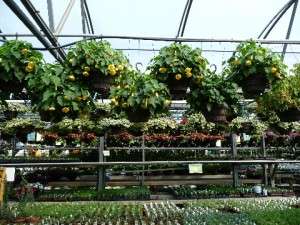Growing Sustainably Since 1984
Categories: News
The outdoor lifestyle is important to everyone at Meadow View. To support the natural world we love, we practice sustainable gardening techniques. Here are some examples:
- We use beneficial insects rather than chemicals to control harmful insects and diseases in our plants. You may even take some of these beneficials home in a hanging basket!
- Our hanging baskets are recyclable and larger than standard plastic baskets which reduces the amount of watering needed.
- Drip irrigation is used where applicable to reduce water waste.
- Plant clippings and used soils are recycled into compost.
- Cardboard and other supplies are collected and recycled.
- We clean, sanitize and reuse our plastic trays and pots annually.
- We build new greenhouse structures that reduce heat loss during cold weather and shade plants during hotter seasons.
Meadow View even shares our sustainability practices with others by recycling our wooden pallets for use by other companies and using our compost to improve the soil of a neighboring nursery.
We encourage our customers to also practice eco-friendly gardening by following these tips:
- Compost: Create a compost pile in your yard. Mix fruit and vegetable waste, soil, dead plants and paper. Never add dairy or meat products. Remember to aerate by turning regularly. Wait at least six months before using in your garden.
- Fertilizers: If you must use fertilizer, aim for natural or organic varieties.
- Insects: Many bugs are good for the health of your garden. While they may not be welcome in your home, try embracing insects and spiders when it comes to your plants.
- Rotate: Don’t grow the same plants in the same spot every year. Change plant locations so the same nutrients aren’t taken from the soil from year to year.
- Mulch: Add mulch to your garden. The extra layer helps hold in moisture so you don’t have to water your plants as frequently. It has an added benefit of controlling weeds.
- Rainwater: Use a barrel with a screen or net on top to collect rainwater that can be used to water your garden.
- Recycle: Save your pots and planters to reuse. Be sure to sanitize or throw away pots that held diseased plants. When buying new pots, look for ones made from recycled materials. Bring unwanted but useable containers to our recycle bin.
For more tips on protecting the environment while you garden, stop by and ask any of our helpful staff members!




Comments are closed.